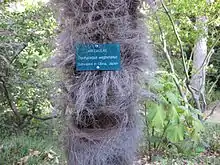Trachycarpus fortunei 'Wagnerianus'
Trachycarpus fortunei 'Wagnerianus' is unknown in the wild, but may have originated in cultivation in Japan, where it was first discovered by the horticulturalist Albert Wagner of Leipzig, Germany in the second half of the 19th century (in 1873). It has remained in comparative obscurity until recently, when its qualities as a garden plant were at last realized.[1]
| Trachycarpus fortunei 'Wagnerianus' | |
|---|---|
 Young Trachycarpus 'Wagnerianus' | |
| Species | Trachycarpus fortunei |
| Cultivar group | 'Wagnerianus' |
| Origin | Japan |
Description
Trachycarpus 'Wagnerianus' is an easily identified cultivar, with small, stiff leaves (much unlike that of Trachycarpus fortunei). The leaves of younger are nearly circular, but those of older plants tend to be hemispherical. At all ages they are relatively small, from 50 to 70 cm (18 to 26 in) wide. and are borne on 60-to-90-centimeter-long (2 to 3 ft) petioles.
The leaf crown is hemispherical and often extended, especially in younger individuals. New growth is margined with a short but dense white woolly tomentum.[2]
The palm's trunk grows to 9 m (30 ft) tall, or more sometimes, and is 20–25 cm (8–10 in) in diameter, when free of the leaf base fibers that tend to remain for a good while.

See also
- Hardy palms
References
- Martin Gibbons. A pocket guide to Palms.
- Robert Lee Riffle & Paul Craft. An Encyclopedia of Cultivated Palms.